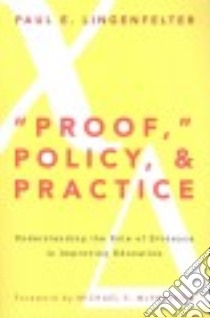Proof, Policy and Practice - 9781579227517
Un libro in lingua di Lingenfelter Paul E. McPherson Michael S. (FRW) edito da Stylus Pub Llc, 2015
- € 26.80
- Il prezzo è variabile in funzione del cambio della valuta d’origine
Researchers, policy makers, and practitioners generally are sincerely interested in improving the human condition. But they rarely work together well. Academics, longing for more influence, may wrongly fault irrationality, ideology, or ignorance for the failure of research to inform policy and practice more powerfully. Policy makers and practitioners, with some justification, may doubt that academics can deliver “what works,” a practice or method that will reliably yield desirable results.
This book aims to bridge the divide. It argues that unrealistic expectations lead to both unproductive research and impossible standards for “evidence-based” policy and practice. It offers promising ways for evidence to contribute to improvement. It analyzes the utility and limitations of the different research methods that have been applied to policy and practice, as well as the strengths and weaknesses of educational reform strategies.
In these pages educational researchers and scholars starting out on their careers can find a framework for their work: What questions are important and accessible? What methods will be fruitful? How can they help policy makers and practitioners make choices and learn how to improve? What information is relevant? What knowledge is valid and useful? How can policy makers and practitioners establish a more productive division of labor based on their respective capabilities and limitations?
Paul Lingenfelter – who has had a long and distinguished career at the Illinois Board of Higher Education, The McArthur Foundation and most recently as president of the State Higher Education Executive Officers association – presents the fruit of his experience in working to shape educational policy at the local and national levels for more than four decades.
He cautions against the illusion that straight-forward scientific approaches and data can be successfully applied to society’s most complex problems – such as educating all children or achieving widespread economic prosperity and mobility. He explains why no single program, no single policy, no simple intervention can solve complex problems, while determination, measurement, analysis, and adaptation based on evidence in specific situations can lead to significant improvement.
This is an even-handed and informative introduction to the quantitative and qualitative tools of professional social inquiry, which concludes by considering emerging practices and approaches that can help scholars, practitioners, and policy leaders become more successful in reaching their fundamental goals.
Informazioni bibliografiche
- Titolo del Libro in lingua: Proof, Policy and Practice
- Sottotitolo: Understanding the Role of Evidence in Improving Education
- Lingua: English
- Autori : Lingenfelter Paul E. McPherson Michael S. (FRW)
- Editore: Stylus Pub Llc
- Collana: Stylus Pub Llc (Paperback)
- Data di Pubblicazione: 17 Dicembre '15
- Genere: POLITICAL SCIENCE
- Argomenti : Education Research United States Educational change United States Education and state United States
- Pagine: 260
- ISBN-10: 1579227511
- EAN-13: 9781579227517


